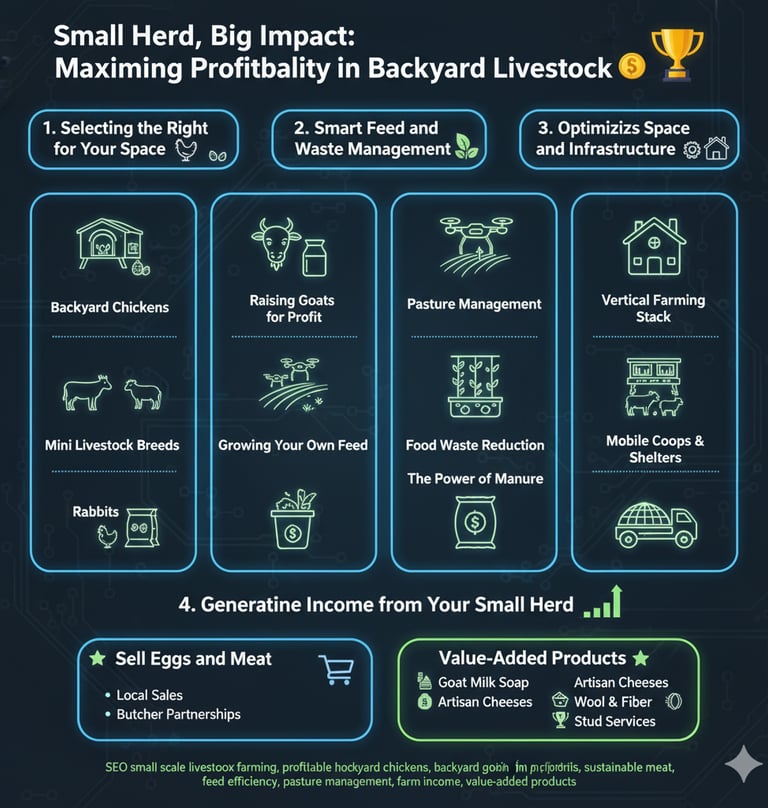Small Herd, Big Impact: Maximizing Profitability in Backyard Livestock
The dream of homesteading and living a more self-sufficient life has captured the imagination of many. For those with a small patch of land, whether a sprawling suburban backyard or a few acres, the idea of raising your own animals is both rewarding and practical. But can a small-scale livestock farming operation be more than just a hobby? Can it actually be profitable? The answer is a resounding yes. By making smart choices and adopting strategic management techniques, your backyard livestock can generate a significant income stream, proving that a small herd can have a big impact. 1. Selecting the Right Animals for Your Space The first step to a profitable small farm is choosing the right animals. It's not about what you want to raise, but what your space can effectively support. Backyard Chickens: The undisputed champion of urban farming, chickens offer a fantastic return on investment. They require minimal space, are relatively easy to care for, and provide a continuous supply of eggs, which are a high-demand product. For meat, consider dual-purpose breeds that grow quickly. Raising Goats for Profit: Goats are a versatile and intelligent choice for homesteaders. They can be raised for milk (dairy goats), meat (Boer goats), or even fiber (Angora or Cashmere). Goats are browsers, not grazers, so they can clear brush and weeds, turning a chore into a resource. They are perfect for a few acres of land. Mini Livestock Breeds: Don't underestimate the power of miniature animals. Miniature cattle (Dexter, Miniature Hereford) are perfect for small pastures and are known for their gentle temperament and excellent meat quality. Miniature goats and sheep are also great for a smaller footprint. Rabbits: Often overlooked, rabbits are an incredibly efficient protein source. They reproduce quickly, take up very little space, and their meat is lean and mild. Rabbit manure is also a highly sought-after fertilizer. 2. Smart Feed and Waste Management Feed is often the single largest expense in raising livestock. Minimizing this cost is key to a profitable operation. Pasture Management: If you have the land, prioritize grazing. Homesteading animals that can graze or browse (goats, sheep, cattle) will spend less time at the feed trough. Practice rotational grazing to allow pastures to recover and to maximize forage growth. Growing Your Own Feed: Consider planting a portion of your land with fodder crops like alfalfa, turnips, or fodder beets. This reduces your reliance on expensive commercial feed and provides a nutrient-rich supplement. Food Waste Reduction: Many animals, especially pigs and chickens, can consume kitchen and garden scraps. This not only reduces your household waste but also supplements their diet with free, nutrient-rich food. The Power of Manure: Animal waste is a valuable resource, not a problem. Learn to compost your animal's manure. You can use it in your garden to grow more food or sell it to local gardeners as a premium fertilizer, turning a cost into an income stream. 3. Optimizing Space and Infrastructure Even with limited space, you can create a highly efficient system. Vertical Farming: For chickens or rabbits, consider multi-level coops or hutches to maximize your vertical space. This allows you to house more animals in a smaller footprint. Multi-Species Grazing: If you have land, consider running different species on the same pasture. For example, sheep can graze on shorter grasses while goats browse on shrubs. Chickens can be moved in behind them to scratch for insects and spread manure, improving soil health. This synergy allows you to get more out of your land. Mobile Coops and Shelters: Use mobile or "chicken tractor" coops to move your flock around your yard or pasture. This helps fertilize different areas, controls pests, and ensures the chickens always have fresh forage. 4. Generating Income from Your Small Herd The final step is turning your production into a profit. The market for locally and ethically produced goods is booming. Sell Eggs and Meat: This is the most straightforward way to generate income. Advertise your backyard chickens' eggs through local social media groups, at your workplace, or through word of mouth. For meat, get to know local butchers who can process your animals and help you sell the cuts. Value-Added Products: Look for ways to add value to your raw products. Goat Milk Soap: Goat milk is rich in fat and nutrients, making it a wonderful ingredient for soap and lotions. Artisan Cheeses: If you are raising goats for profit, learn to make simple cheeses that you can sell at local farmers' markets. Wool and Fiber Products: If you raise sheep or Angora rabbits, you can sell raw fiber to crafters or even learn to spin it into yarn yourself. Stud Services or Breeding Stock: If you have a particularly good-natured or high-producing animal, consider selling its offspring or offering stud services to other small farmers. This is a very profitable niche. A small-scale livestock farming operation is a powerful testament to the idea that you don't need hundreds of acres to make a significant impact. By carefully selecting your animals, managing resources, and tapping into the growing demand for local, high-quality products, your backyard can become a true hub of productivity and profit.
Mr. Diyan Ahmed
9/25/20251 min read


Connect
Partnering for innovation across industries.
Explore
Discover
+923001534092
© 2025. All rights reserved.
